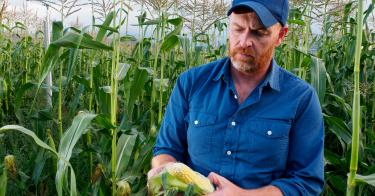Food prices are rising at rates not seen in over 40 years.
But skyrocketing prices are not the only food issue that should concern U.S. policymakers. Russia’s invasion of Ukraine could lead to global food shortages.
While the U.S. doesn’t rely on Russia or Ukraine for food, many countries—such as those in North Africa and the Middle East—do. If they are unable to import food from them, this could lead to significant problems, including famine, mass migration and political instability.
And food shortages abroad also could exacerbate inflation in domestic food prices, which already is crushing Americans.
>>> Food Price Inflation Continues to Worsen. Here’s What Should Be Done About It.
There’s still time to mitigate the risk and extent of war-related global food shortages. To do so, Congress and the Biden administration will need to look beyond simply providing food assistance to other nations.
They also must remove government interference that undermines the effectiveness of that assistance and raises costs throughout the entire food supply chain.
The U.S. provides more food aid than any other nation on Earth, but we don’t help as many people as we should because U.S. law requires large amounts of that aid to be purchased in the U.S. and shipped on U.S. vessels. This significantly raises costs. We could feed literally millions more hungry people just by removing these requirements.
Generally, the primary objective should be to increase the global food supply, to help offset the food that may not be available due to the war. This means removing obstacles to food production and distribution.
Energy policy is a great place to start because it affects the entire food sector. In March, energy prices rose 32% compared to March 2021. Year-over-year energy prices have increased above 25% in each of the last six months. The Biden administration has essentially declared war on fossil fuels, so Congress will likely have to step in to undo the self-inflicted harm caused by this administration.
Policymakers need to end restrictions on natural gas extraction and use, including on federal land and the Outer Continental Shelf. They should also withdraw the new National Environmental Policy Act final rule, which guts the Trump administration’s commonsense changes to expedite the development of energy and infrastructure projects.
Energy policy also affects fertilizer costs. More than 57% of fertilizer used in the U.S. are nitrogen-based and a critical input for which is natural gas, accounting for 70% to 90% of its manufacturing cost.
Another way to address current high fertilizer costs is to remove controversial countervailing duties on Moroccan fertilizers and not impose new duties on fertilizers from other countries.
Then there’s the Conservation Reserve Program, which literally pays farmers not to farm some of their land.
>>> 3 Recent Examples of Government’s Environmental Extremism
Agricultural groups recently requested that the USDA allow the farming of idled land without penalty. The USDA rejected the idea, saying it would cause “a significant and detrimental impact on producers’ efforts to mitigate climate change and maintain the long-term health of their land.”
Talk about disrespecting farmers! They care far more about the health of their land than Washington bureaucrats. To help increase the global food supply, policymakers should let farmers grow more food—without penalty—on this idled land, about 25% of which is considered prime farmland.
Further, policymakers should eliminate biofuel mandates so that crops, such as corn and soy, can be used to meet demand, be it for food, feed, or fuel. And they should ensure that the U.S. leads international efforts to discourage other countries from restricting the export of their food. Export restrictions increase prices by reducing supply. This leads to shortages and hurts low-income importing countries.
This is a critical and time-sensitive moment. Policymakers can act now to help stave off a food crisis and reduce food inflation. But their actions—or inaction—could also make matters worse. Let’s hope they choose the right path.
This piece originally appeared in The Washington Times



